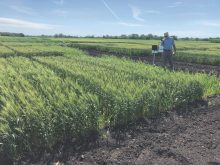A few unhappy farmers probably went home from the commodity organizations annual general meetings in Saskatoon this January singing Rolling Stones tunes to themselves. (1)
During this year’s Saskatchewan commodity group AGMs, the chairs of two levy-funded commodity groups explained to their members why they’d decided not to take action on contentious resolutions passed at last year’s AGMs.
Farmers at the last year’s SaskWheat AGM passed a resolution asking that SaskWheat join Cereals Canada (a national organization made up of farmer organizations, exporters, processors, seed companies and crop input companies). At the Saskatchewan Pulse Growers AGM, members passed a resolution asking the board of directors to make the SPG levy refundable, rather than mandatory. There were passionate farmers on both sides of each of these issues.
Read Also

Health hazards are often overlooked risks on the farm
While quite different from the dangers posed by farm machinery, hazards such as loud noise or sun exposure require the same proactive attention, the Canadian Agricultural Safety Association says.
- Editor’s Column: New Internet plan, same problems
Farmers fund all of these commodity organizations — from the Manitoba Oat Growers Commission to the Alberta Canola Producers Commission — through direct deductions when we sell grains, oilseeds or pulses. These organizations use our money to fund research, advocate for us, and provide us with agronomy information. Paying levies gives us the right to benefit from the information and the right to vote for board members.
As we saw this year, the resolutions that members discuss and pass at commodity AGMs are non-binding. Is this acceptable?
The process
Corey Ruud is the general manager of the Agri-Food Council, the independent board that monitors all of Saskatchewan’s agri-food agencies. He was at both of these AGMs. I asked him if the Agri-Food Council would have concerns about the way these two resolutions were handled.
He told me that these organizations followed the correct procedure. “The process they followed is the process the council has encouraged them to follow.”
Board chairs of both SaskWheat and the SPG came to their AGMs prepared to address last year’s resolutions — they each gave full reports of what they’d done to study the issues and why they’d decided not to take further action. The SPG had taken a member survey about refundable levies. SaskWheat had attended Cereals Canada board meetings.
Terry Youzwa, farmer and outgoing chair of the Saskatchewan Canola Development Commission, doesn’t agree with the decision taken by the SaskWheat board of directors with respect to joining Cereals Canada, and doesn’t believe the SaskWheat board has done enough due diligence. “When the membership speaks, that’s an expression of the stakeholders,” he said.
I asked him when he would feel that SaskWheat had done enough due diligence in this case, and he said that, for him, this issue would be over when members stopped bringing it to the floor. “When growers continue to annually ask the same question, there’s definitely a significant level of concern,” he said.
Non-binding resolution
When you consider whether resolutions should be binding at these meetings, there is one key fact that can’t be ignored. Only the farmers who show up at the AGMs can vote on resolutions. So far, at these commodity organizations’ AGMs, there are typically just enough farmers in attendance to make quorum (that’s 25 farmers for the SPG or SaskWheat). There’s no guarantee that these particular farmers at the meeting have given any thought to the issue behind the resolution. Some may have heard about it for the first time 10 minutes before they put up their hand to vote.
A determined farmer with a strong position on an obscure policy could quite easily “stack” the vote at an AGM by making sure a dozen like-minded members showed up and raised their hands.
How much of this low turnout can be blamed on farmer apathy and how much on the practicalities of getting to Saskatoon in January when it’s -30 C is anyone’s guess, but it seems clear to me that we can’t have a situation where 25 unelected farmers can set the agenda for a provincial organization that we’re all funding.
All levy-paying members can vote for board members. We need to make sure we elect people who will carefully research issues and make good decisions. Of course, voter turnout for these organizations’ board elections isn’t exactly stellar either. But at least you can vote from home when it’s convenient for you — nobody needs to make a 10-hour round-trip drive. Even with my slow Internet connection, I was able to cast my ballot in these online elections in pretty good time.
Changing the system
You might be thinking that farmers who care enough about a resolution should make getting to the meeting a priority — icy roads or not. However, there’s no way to know in advance what resolutions might come to the floor at an AGM. Anyone can bring an issue forward. The SPG’s regulations say that two-thirds of the farmers at the meeting must agree before a resolution can be added to an agenda, which isn’t a major hurdle, and SaskWheat’s regulations allow for debate on any resolution related to its mandate.
You might be thinking that this could be changed — members could be required to submit resolutions in advance. The organizations could send out lists of upcoming resolutions, giving everyone time to warm up their trucks and make a hotel reservation. In theory, that’s a great idea. But in practice, that would mean submitting resolutions to the organizations’ offices well in advance of the annual meetings. If a farm family came up with a brilliant policy idea at the Christmas dinner table in 2017, it would be January, 2019 before the idea could be discussed at an AGM.
Now that the Internet has made communication easier, even when it’s slow, you might argue that these resolutions could be turned into binding referendums, where all farmers could vote online to resolve a debate.
But remember, we typically have a low turnout with online voting for the leaders of these organizations. Turnout for referendums might be laughably low.
When only a small number of votes are required to make changes, things can get silly in a hurry. Here’s a fun example. In 2000, the short-lived right-wing federal Canadian Alliance party proposed a system that would make sure Canadians got what they want. The Canadian Alliance, led by Stockwell Day, suggested a formula: if three per cent of voters (about 350,000 people) signed a petition, a referendum would be triggered so all Canadians could have a fair vote on the issue at hand.
This sounded reasonable, until comedian Rick Mercer got involved. He used his spot on the TV show “This Hour has 22 Minutes” to promote his own petition. Soon 370,000 Canadians had signed a petition demanding that Stockwell Day change his name to “Doris Day.” (2)
Giving a small minority of members the ability to pass binding resolutions — whether online in a referendum or in person at an AGM — could soon result in policies many of us wouldn’t want to live with.
To make sure we have far-sighted decisions made by people who’ve taken the time to study the issues in depth, we’re going to have to trust the people we’ve elected to do these jobs. Sure, these elected board members should use resolutions and discussion at the AGM as guidance, but they should also take into account all of the other conversations they’ve had with other farmer members during the year. They should consider what they’ve learned through studying the issues and through meeting with other stakeholders. Once we’ve elected them, we need to give our board members the freedom to make the best decisions they can.
While this system can’t give everyone what they want all the time, it beats the alternatives. Nobody wants a system where SPG chair Corey Loessin is forced to change his last name to Hart and wear dark glasses to all of the SPG’s evening banquets. (3)
Footnotes:
1. Specifically, “You Can’t Always Get What You Want,” from 1969, which was also played after Donald Trump’s nomination acceptance speech at the Republican Convention in November, 2016.
2. Doris Day is an American singer/actress who was nominated for an Academy Award in 1959 for her work in a movie called “Pillow Talk,” which must have been better than it sounds. She’s either 92 or 94 now; sources disagree.
3. The iconic Canadian singer Corey Hart’s first single “Sunglasses at Night” was released in 1984 and climbed to No. 7 on the Billboard Hot 100.














